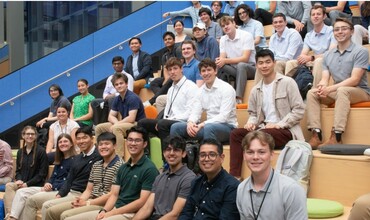The Draper Scholars Program emphasizes empowering students in 16 key research areas to make the greatest impact. We encourage applicants to align their research with these topics.
Artificial Intelligence and Machine Learning
Draper uses Artificial Intelligence and Machine Learning to provide critical capabilities to advanced systems in the national security, biosecurity, space, and military domains. In doing so, we face challenges both in developing new ML models due to sparse, irregular, non-representative, or incomplete training data sets and in leveraging foundational models such as large language models or vision language models that have been optimized for certain data types, situations, or applications that differ from our domains of interest. Another challenge is building calibrated trust between the AI systems and users to prevent critical errors and increase adoptability into operations. Draper seeks methods to advance the state of the art in this field.
Operational AI leveraging ML from imperfect data sets
Training successful ML algorithms, especially deep learning models, requires large, comprehensive data sets that are similar to those collected in operation use conditions. In many of our domains of interest it is not feasible to generate large sets of training data because there are historically few examples or the events of interest are infrequent or unique. Additionally, many missions are extremely fast paced with high levels of uncertainty. Deployed AI systems with ML models must be trusted to operate in way that increases accuracy or efficiency without introducing unnecessary burden to the user or causing critical failures.
We are typically interested in PhD candidates for the development of novel approaches and MS candidates for the application of existing approaches to solving open problems-of-interest to Draper.
Technical Point of Contact
Research Interests
Secure and Trusted Systems
Includes techniques for ensuring deployed AI-models are reliable, robust, and mission-relevant, as well as utilizing AI techniques to secure devices or other systems against intrusion or misuse. Specific topics could include:
- Mission planning, mission management, and decision support
- ML models that enable self-assessments of performance in areas such as uncertainty, data quality, or reliability
- Offensive and defensive cybersecurity
AI-enabled Design and Manufacturing
Improving manual, resource-intense optimization and manufacturing processes to create electrical, mechanical, or integrated hardware designs, including the validation and verification stages. Target devices would include:
- Semiconductors or microelectronics
- Electromechanical systems
- Precision sensors, such as those used in navigation or biosecurity
AI at the Edge
Adding intelligence to systems that have limited computing power, face limited training data, and/or operate in challenging environments (e.g., space and undersea). Areas of interest include:
- Distillation and knowledge transfer techniques for using knowledge from large foundation models in edge applications and new domains
- AI that adds resilience and adaptability to systems in novel, complex, or uncertain situations
- Co-design of sensors and AI
- AI that operates on extremely small hardware and/or with small software and processing loads
Have Any Questions?
To learn more or stay up to date with our key areas, please fill out the below contact form.

